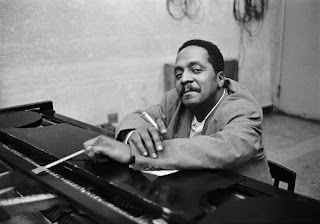When we think about bebop piano, we can’t help but think of Bud Powell… but we all know that there were many, many other incredible piano players on the bebop musical scene.
Far be it from me to want to name them all, and I apologise if I leave out someone who you think should absolutely be named, but these few words are meant just to give some critical suggestion aimed to broaden and deepen our stylistic approach to bebop pianism.
Let’s start from the beginning: the key dualism, I’m sure you’ll agree, is the eternal fight Powell-Monk.
Bud brings into bebop his enormous traditional/stride/harmonic skills and experience (it is sufficient to listen to his ballads/middle bounce pieces to realise it), developing a language made of fire, incredible technical control, mastery of tension and resolution and carefully legato touch.
Thelonious takes a completely different path: his “zombie music” is made of paroxysmal attention to compositional and harmonisation details, aimed at proposing highly personal extra-dissonant solutions (often unresolved), dazzling and unexpected chord substitutions and, above all, a “naïve”, disarticulated pronunciation evoking chthonic abysses of almost mad introspection.
Who is better? Stupid question, in my humble opinion: both, in their own particular way, are giants of music and bebop masters, both should be studied, understood and deeply internalised by every serious jazz student.
And then? Barry Harris indeed - at a first glance a sort of Bud Powell in sixteenth, in realty an extremely refined and personal artist, a brilliant scholar and teacher and a great human being. His musical and theoretical contribution to jazz is unattainable, and is strenuous and continuous effort to protect the bebop purity is not, I believe, the fruit of a dull and embalmed conservatism, but the reflex of honest and sincere love for his music.
Listening to Barry, let’s look to his great ability to concot short, punchy and memorable phrases - with impeccable melodic drive, blues feeling and perfectly balanced tension/resolution; then, his harmonic approach made of “little chords” dense of his so called “6th diminished chord movements”; last but not least, his burning swing originating from an articulation a little less legato compared to the Bud’s one.
And now the famous “session three”: Wynton Kelly, Red Garland and Tommy Flanagan; three refined musicians, great accompanists, lyrical soloists and, due to their rather simple and flowing improvisational concepts, three great sources of learning material.
And then George Shearing and his block chords (and much more), Ahmad Jamal, Sonny Clark, Tadd Dameron (fine composer as well), Hank Jones, Richie Powell (Bud’s brother), Dodo Marmarosa, Kenny Barron, Lennie Tristano, Junior Mance, the incredible virtuous Phineas Newborn… the list is virtually infinite.
Let’s end on a controversial note with three enormous artistic personalities: Oscar Peterson, Dave Brubeck and John Lewis.
Oscar is the master of swing, virtuosity and blues feeling, but some snob music critic keeps on accusing him of being artificial, repetitive, empty and impersonal; bullshit in my humble opinion, listen to him and you’ll understand what swing is - nuff said.
Dave is indeed a little coy, with his desire to always be “different” and his love for bizzarre forms and uneven time signatures, but his contribution to the diffusion amongst joint people, students and general public has been invaluable, and we should respect him for his rentless effort.
Last, John Lewis and his work with the MJQ, aimed at finding a synthesis between jazz and classical atmospheres - with uneven results, I should say.
But he was my dear dad favourite pianist, so sometimes I listen to him “for sentimental reasons”.


No comments:
Post a Comment